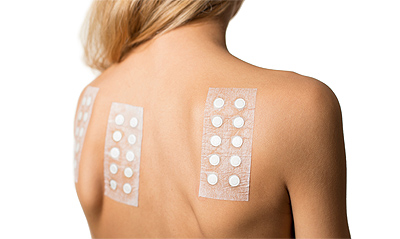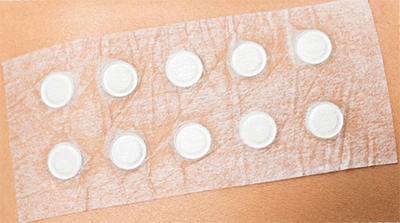Allergic Contact Dermatitis Patch Testing in Boston
Jump To
Conveniently located to serve Boston

Patch Testing is useful in diagnosing the cause of a very itchy rash called allergic contact dermatitis. Contact dermatitis occurs when the skin reacts to some allergen after direct contact with the skin. Patch testing can also be helpful in uncovering the cause of burning skin and some types of itching.
During the patch testing process, various substances are applied to the skin and taped down. Most often, these patches are placed in an area that is not visible and is hard to reach (like the back). These patches are removed after two days. At the time of removal, the dermatologist looks for any potential reactions on the skin and does the initial interpretation of the test. The dermatologist then checks the area again four days after the patches were applied and does the second and final interpretation of the test. It is at this time that a patient may know what allergen is causing the allergic contact dermatitis.
This test does require three trips to our office during a five day period. You should not take any prednisone pills or anti-histamine medications while undergoing this test.
Brand Names:
Our office uses the allergEAZE North American Standard Series for allergy testing which tests for 70 allergens.
What is it?
Patch testing is indicated for use as an aid in the diagnosis of allergic contact dermatitis for person 18 years of age and older. The allergens are loaded into patch chambers and applied to the patient’s back.
Patch testing identifies allergens that come into direct contact with the skin like those found in personal care products, fragrances, clothing, jewelry or topical medications. Patch testing is very different from skin prick testing that is done by an allergist. Patch testing will not tell you if you are allergic to certain foods, animals or pollens.
Does it work?
Patch testing can be extremely helpful in uncovering the cause of allergic contact dermatitis and itching, but it is not always conclusive. Patients should be aware prior to the testing that the results may not be definitive and may, in some cases, be clinically irrelevant.
Test preparation:
Your dermatologist will give you preparation instructions to follow before the patch test can be done. Following these instructions diligently will aid in ensuring accurate diagnosis:
- Do not take any prednisone pills or anti-histamine medications while undergoing this test.
- Do not use creams and/or ointments on the test area. Application on other areas is acceptable.
- Avoid using moisturizers on the day the patch testing is to be done.
- The test cannot be done on your back if it is sunburnt.
Things to consider:
Each patch placed on the skin contains different substances to test for a specific allergy. The dermatologist will use a marker to outline a specific sheet and then apply it with sticky tape.
Things to consider:
Patch testing requires commitment on the part of the patient. The patient is required to schedule 3 appointments over a 5-day period. The patient will have the patch test placed on a Monday (this involves putting sticky paper on the back), return to the office on Wednesday for patch removal, and return to the office on Friday for the final reading/results.

If the patch does not adhere properly and falls off, let the dermatologist know so that it can be replaced. If you have a positive reaction (the test site becomes itchy), the dermatologist will then discuss how to avoid the specific allergen that you are reacting to.
During the testing week:
The patient may take one gentle shower between Monday and Wednesday but must not get their back wet after patches are removed on Wednesday, as this could result in a false negative reading.
Do not expose the patch area to the sun and heat, since excessive sweating can impact the test. During the entire patch testing week, patients are encouraged to refrain from activities that may cause excessive sweating like spinning, running or kick boxing for example.
No soap, creams, or moisturizers should be applied for the duration of the testing. Additionally, you must avoid scratching or trying to remove the tape. For best results, patients should not take anti-histamine pills (also known as allergy pills) or use topical or oral corticosteroids while undergoing patch testing.
Side effects:
Serious side effects from patch testing are rare. The most common side effect is itching at the site, which resolves upon completion of the test.









